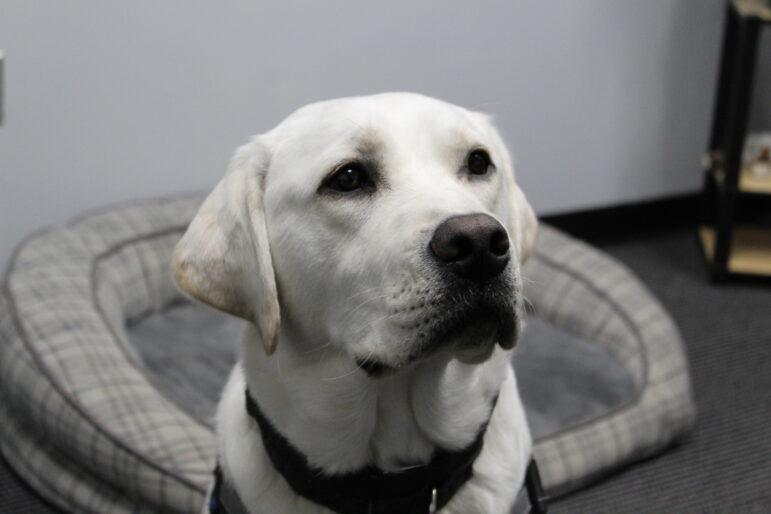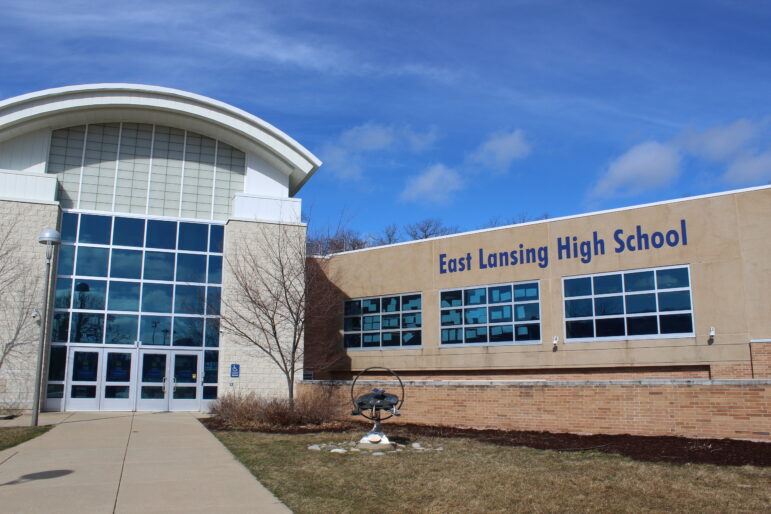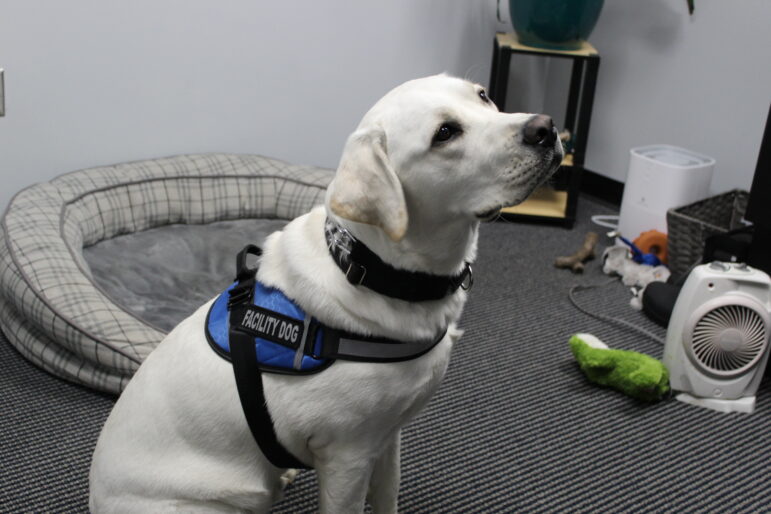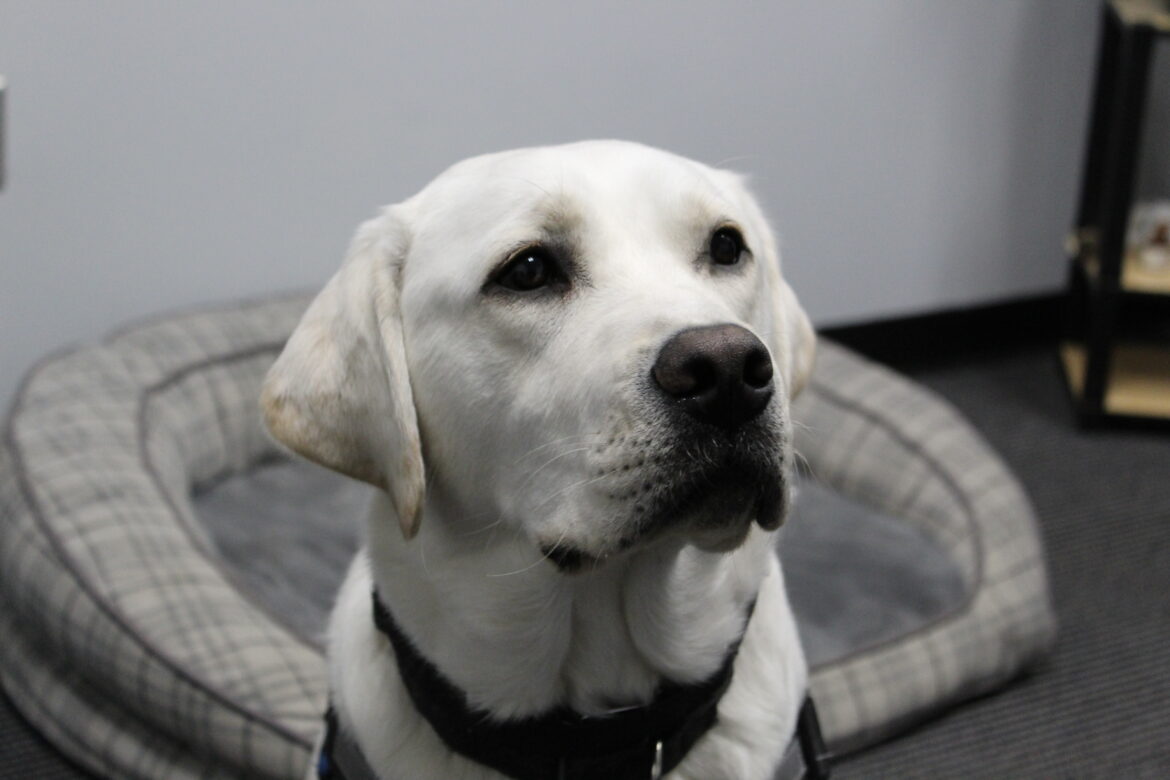When ELHS students returned to campus following the Feb. 13 shooting at Michigan State University, Gus was there to greet them.
Last school year, the East Lansing school district decided putting facility dogs into their buildings would be beneficial for both students and staff. The goal was to place a dog in every building. With the help of the organization Canines for Change, the district now has a dog in every building but one, Donley Elementary School, according to Jennifer Jockheck, East Lansing High School counselor and handler for Gus, the facility dog for the high school.
“It was really about bringing something positive into the schools,” said Jockheck “and he’s [Gus] been such a positive presence.”

Jockheck recalls the impact Gus had on the students following the Feb. 13 shooting at Michigan State University. On the Wednesday on which students returned to school, the high school counselors provided a safe space where students could come to process, share, seek out help, or just be.
“A lot of kids were upset, but didn’t want to just sit there and talk about it forever, just rehashing it. They just wanted a minute to take a breath and reset, and he [Gus] was great for that. Some of them wanted to talk and some of them just wanted to pet him. It was just such a safe space.”

Alexis Bolo Neal, public relations and social media coordinator at Paws With A Cause, an organization that provides people with both assistance dogs and facility dogs, explained the purpose of a facility dog and the process of training one.
“The role of a facility dog is to provide comfort, companionship, and care for more than one person,” said Bolo Neal.
Facility dogs are trained to help a variety of people in large group settings, such as hospitals, residential homes, and schools. This is what differentiates them from the assistance dog, whose purpose is to mitigate a disability for one person by providing different types of tasks and help, Bolo Neal said.
Wherever the facility dog ends up, it will have what is called a handler. The handler’s job is to take care of the dog and to assist in training the dog.
For Jockheck, the decision to become a handler was an easy one. She applied for the position through the district and had to attend weekly trainings. Beginning in July, she was officially Gus’ handler. Gus just recently passed his test, so the training is no longer required, and he is a fully certified facility dog.
“I had to agree to attend weekly training as well as spending time working on the training with Gus on my own time,” said Jockheck. “As a handler, you also have to agree that the dog is not your property, the dog is the district’s property. For all intents and purposes, he is my dog. He lives with me, if we go on vacation, we take him, but he’s not technically my dog.”
All facility dogs go through foster puppy raising first, learning basic obedience commands, which usually lasts 12 to 16 months, according to Bolo Neal. Paws With A Cause also has enforced a second step in the training, where each facility dog is placed in one of five Michigan prisons, where they receive hands-on training for 24 hours a day from inmates.
“We love this program at Paws,” said Bolo Neal, “because not only does it provide companionship and a job for someone within a prison, but it also gives us the opportunity to have our dogs handled 24 hours a day, and that’s really important for our dogs.”
Both of these trainings combined provide facility dogs with simple commands such as “sit, stay, or down,” but also train them to be social, reliable, and a full-time companion.
As mentioned previously, the purpose of a facility dog depends on the organization or building they are assisting, but the benefits have been plentiful. For Jockheck, she believes that the number one benefit of having Gus in the school has been the positivity.
“I’ve seen kids that normally wouldn’t open up, open up when they’re sitting and petting him,” said Jockheck.

Bolo Neal also reflects on the benefits she has seen placing facility dogs in schools.
“We have noticed that throughout all of the schools, the students are saying ‘I can’t help but smile when I see the dog,’” said Bolo Neal.
The facility dogs also help in coping with anxiety, alleviating stress, and reducing bullying.
“With the younger kiddos, specifically, we are seeing a reduction in bullying because the children have a common topic to talk about, where maybe they didn’t have anything in common before,” added Bolo Neal. “When they’re all being nice to the dog, they all have something that they love together, so it kinda unifies them as a team, which is really neat to see.”
Bolo Neal shares some of the testimonies she has received from students and faculty whom they have helped place facility dogs into their buildings. “When they [the students] are with our dogs, their stresses, anxieties, and worries just seem to melt away,” said Brent Noskey, Belding Area Schools Superintendent. “Our kids and staff’s eyes light up every time they see our dogs. We used some of our Covid grant funds to cover the cost of these dogs and I don’t know if I have ever made a better investment dollar for dollar in my 33 years in education.”
ELHS is seeing similar benefits in their building concerning the positivity that a facility dog brings.
The impact that Gus has had on the students, staff, and the building as a whole has been immense, including the improvement of positivity and unity, the alleviating of stress, and simply a friendly face to have around.
“It’s a lot of work, but it has been such an amazing experience,” said Jockheck. “I love watching the kids interact with it. And he is so good about it, he loves everybody, he comes at everybody with a tail wagging, and their faces just light up.”
